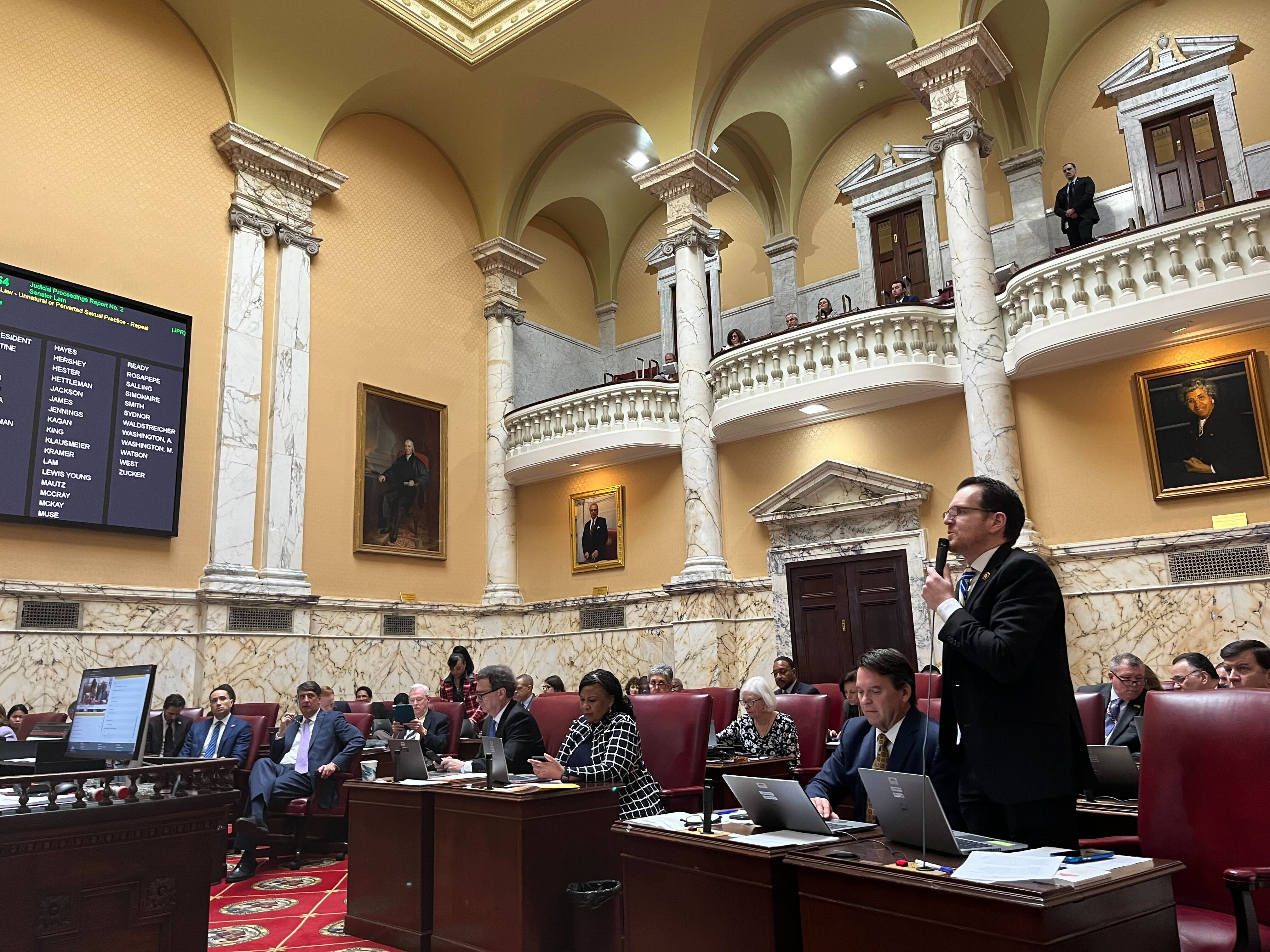ANNAPOLIS, Md. – A Republican senator concerned about a bill’s impact on minors delayed full Senate consideration Wednesday of a proposal that would repeal the criminalization of oral sex among consenting adults.
The bill “Criminal Law – Unnatural or Perverted Sexual Practice- Repeal,” also known as SB 054, came to the Senate floor Wednesday for second reading after the Judicial Proceedings Committee gave it a favorable report.
Sen. Justin Ready, R-Carroll and Frederick, asked for the bill to be delayed – called a special order – until Thursday. Ready said he wants to ensure that the bill will not affect prosecution of sex crimes involving children.
Under current Maryland law, a person may not “take the sexual organ of another or of an animal in the person’s mouth, place the person’s sexual organ in the mouth of another or of an animal, or commit another unnatural or perverted sexual practice with another or an animal.” The offense is a misdemeanor punishable by a fine up to $1,000, imprisonment not exceeding 10 years, or both.
This statute is coming under fire because it prohibits adults from engaging in the private act of oral sex. Consensual oral sex between adults would no longer be a crime if the bill passes.
“The current statute is extremely outdated, likely unconstitutional, and also criminalizes consensual oral sex,” said bill sponsor Sen. Clarence Lam, D-Anne Arundel and Howard, at the Judicial Proceedings Committee hearing Feb. 1.
In 2020, the Maryland Senate voted unanimously to repeal the criminalization of sodomy. However, the crime of “unnatural and perverted sexual practices was left on the books because it was assumed that the charge wasn’t used against consenting adults,” said Lam at the hearing.
Two recent incidents prompted Lam to urge for the statute’s repeal. One was the controversial 2021 Supreme Court decision in Dobbs v. Jackson, which overturned the abortion rights case Roe v. Wade and sparked nationwide protests from reproductive rights activists.
At the hearing, Lam expressed concern following the Dobbs decision that precedents protecting bodily autonomy now face the same chances of being overturned. Lam mentioned the concurring court opinion written by Supreme Court Justice Clarence Thomas, stating that “we should consider all of the court’s due process precedents” moving forward, including Lawrence v. Texas, which decriminalized sodomy.
“I believe it’s an important lesson for legislators that we shouldn’t assume court decisions will stand forever, and we should periodically update our laws to ensure that we aren’t overly relying on court decisions as past precedent,” said Lam. “As the elected legislative representatives of Maryland, we have a responsibility, I believe, to remove this law from our books to ensure that Marylanders are not solely relying on a court decision to protect their rights.”
The other incident that sparked urgency for a repeal occurred in Harford County in 2021, when four gay men were arrested on charges of “unnatural and perverted sexual practices” from engaging in consensual oral sex. Despite the charges eventually being dropped, these men were still arrested and had to petition to have the charges expunged.
At the hearing, other backers of SB 054 stated their distaste for the statute, mentioning how these sex laws are historically discriminatory for the LGBTQ+ community and were declared unconstitutional by the Supreme Court in 2003.
“This statute remains a relic of an earlier time when institutionalized homophobia was written into the state’s criminal code,” said Jamie Grace Alexander of FreeState Justice, an LGBTQ+ advocacy group, at the hearing.
The statute, Section 3-322, directly as written, has been interpreted to criminalize any sexual activity that is not vaginal intercourse, therefore discriminating against same-sex partners, said Jer Welter, deputy chief appeals counsel in the Office of the Attorney General.
“The continued existence of this statute on the books demeans the dignity of LGBT Marylanders, and it is also completely unnecessary, and its use is fraught with practical problems for prosecutors,” said Welter.
Lam emphasized that SB 054 would not decriminalize sexual offenses, such as bestiality and sex crimes involving children, which are established in separate statutes.
Despite this, Ready and others want to make certain that is the case.
“I just special-ordered for a day just to check on the details of it and talk to a couple of law enforcement people, just to be sure it’s correct,” said Ready.
The bill is expected to be heard again Thursday, when the Senate will decide whether it will advance.

